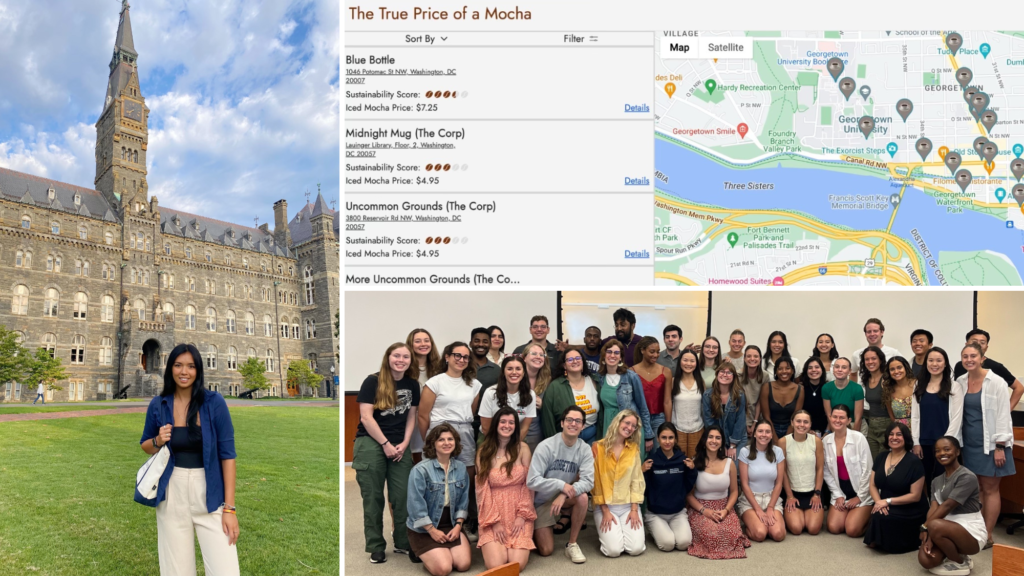The Death of In-Person Shopping? Georgetown Professors Weigh In on Consumer Behavior & Sustainability this Cyber Monday
Black Friday and Cyber Monday are among the biggest shopping events in the United States. Businesses look to increase their sales and revenue, while consumers look to secure the best discounts. Excitement, anticipation and deals are the essence of these annual events. With several major winter holidays just around the corner, everyone gears up to buy valued gifts for loved ones on these days.
As online shopping has become more popular, deals are now only clicks away. Before this, consumers used to line up for an hour or two before stores’ opening hours to make sure they got the best deals. In a way, e-commerce has changed the way people shop forever, ringing in the death of in-person Black Friday shopping.
However, in recent years, both consumers and businesses have increased their focus on sustainability during the holiday shopping season. With an increase in online shopping, greenhouse gas emissions and packaging waste have become an even bigger concern. As these issues continue to escalate, companies have slowly begun to adopt sustainable practices, such as offering recycled or upcycled products, donating to environmental causes and enacting a zero-waste policy.
Georgetown professors Luc Wathieu and Vishal Agrawal share their perspectives on buying habits, consumer behaviors and practical applications for sustainable shopping this time of year.
Pros & Cons of Marketing Cyber Monday

Luc Wathieu
Luc Wathieu is a professor of marketing at Georgetown’s McDonough School of Business, where he has spent the last 11 years of his professional career. Prior to this, he was the associate dean of faculty at the European School of Management and Technology in Berlin, Germany. His research focuses on the economic and psychological factors that help B2B and B2C markets understand consumer empowerment. This research addresses pricing psychology, habit formation, brand loyalty, advertising language and corporate social responsibility.
In Wathieu’s professional opinion, businesses look forward to Black Friday and Cyber Monday to compete for market shares and expect a surge in demand, with discounts being a key determining factor. As online shopping becomes more prominent, it has become easier for consumers to shop for deals and discounts.
“E-commerce has produced an extension of the deal season before and after these days, and several other deal events (e.g., the October Prime days on Amazon) that target different types of shoppers, who are more anxious and less price sensitive,” says Wathieu.
On the positive side, online shopping provide a flexible, convenient and personalized shopping experience for consumers. It also comes with the associated economic efficiencies for suppliers and consumers. As great as this sounds, unfortunately, there are some drawbacks that come with the personalized shopping experience. Some of those are labor challenges and environmental sustainability concerns, weakened mechanisms of brand reputation, consumer dependence and the rise of unreliable information.
“Consumers are increasingly dependent on major players that anticipate their preferences and engage them in repeat interactions and subscriptions,” says Wathieu.
In the future, Wathieu believes that new technologies and consumer awareness will help consumers find better, more meaningful offerings online thanks to AI-driven transparency tools, ethical consumer platforms, or other innovations.
Actions for the Sustainability-Conscious Consumer

Vishal Agrawal
Vishal Agrawal is the co-academic director of the M.S. in environment and sustainability management program – a joint offering between the Graduate School of Arts & Sciences, the McDonough School of Business and the Earth Commons Institute. He is also the Henry J. Blommer Family Endowed Chair in Sustainable Business at Georgetown McDonough. He began his journey at Georgetown as an assistant professor in 2010 and has been with the school for 14 years.
Agrawal’s expertise lies in sustainable business operations, supply chain sustainability and managing sustainability challenges. Based on his expertise, he notes that people often assume that smaller or independent businesses are more sustainable, while that is not the case.
“It is easier for big corporations to be sustainable. They have the power, scale and technology to induce upstream suppliers to adopt sustainable practices and, therefore, be more sustainable overall,” says Agrawal.
Prior to the COVID-19 pandemic, which rapidly led consumers around the global to shift gears regarding their preferred purchasing habits, Agrawal shared a list of tips for consumers to evaluate the sustainability efforts of the companies they are buying from. He believes that these tips are becoming more useful and relevant today.
The first tip is to do your research and check that the companies you are buying from have sustainable business practices via their corporate social responsibility and product packaging. Second is to not only consider the end of product life, i.e. recycling, but also how companies are reusing and refurbishing things at the beginning of the product life cycle. This will help extend their longevity. Ensure that the labels you see printed on the products are authenticated by an independent third party because not all certifications, such as organic or fair trade, are credible.
Achieving environmental sustainability is not an easy task. It takes effort and consistency by the consumer to make progress in their personal lives.
Agrawal urges consumers to start small. “It is a good first step to look for those companies that are more sustainable than their competitors,” says Agrawal. “No product or company is perfect in terms of its sustainability.”



